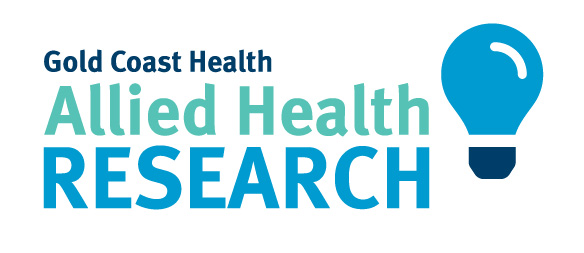
Our Allied Health Research Team provide tailored research support and mentorship to Allied Health Professionals across the Gold Coast Hospital and Health Service including Audiologists, Dietitians, Occupational Therapists, Pharmacists, Physiotherapists, Psychologists, Social Workers, Speech Pathologists, amongst others. Each of these professions are undertaking innovative research with most having their own research groups or committees.
The Allied Health Research team aims to help build the research culture and capacity of these allied health professions and their collaboratives to ultimately improve health care services and outcomes. The team leads the development and implementation of the Allied Health Research Plan, as well as research which formally evaluates innovative research capacity building initiatives.
Vision for Allied Health Research
Embedding an inspiring research culture to transform and improve healthcare for our community.
Our Mission Statement
We will nurture an inclusive research culture across Gold Coast Health Allied Health through collaboration and innovation, to lead and implement outstanding consumer-focused research which improves healthcare.
Allied Health Research Plan 2024-2026
An overview of Allied Health Research’s Plan for 2024 to 2026 provides the Allied Health Research vision, mission and key objectives, which align with the strategic pillars of the Gold Coast Health Allied Health Strategic Plan 2024-2026. In consultation with key stakeholders, the Allied Health Research team has developed activities, measures and timeframes to fulfil these key objectives.
Summary of Research Activity
Summary of Research Activity
The Allied Health Research Activity report 2024-2025 showcases the breadth of innovative research activity undertaken by Gold Coast Health allied health professionals. This includes 106 research projects, 126 journal publications, and 122 conference presentations across multiple service areas. Some emerging themes and areas of strength within Allied Health research include:
- The use of digital technology to drive innovation
- Multidisciplinary models of care and interventions to deliver patient centred, value-based health care including primary contact clinics
- Optimising patient flow and access to improve efficiencies for our patients.
- Evaluation of research capacity building initiatives
Allied Health Research Newsletter
Read the latest research news, opportunities and achievements from our Gold Coast allied health workforce: Allied Health Research Newsletter - November
Previous newsletters:
Allied Health Research Events
Allied Health Research Networking Even 24 July 2025
- View the Gold Coast Health and Partners Allied Health Research Networking Event 2025 Program here: https://sway.cloud.microsoft/Vq1x3wYbVwne58eI?ref=Link
Our Allied Health Research Team
The Allied Health Research Team includes temporary and permanent positions that are either solely funded through GCH or jointly funded with a University.
If you are interested in a potential collaboration or to discuss a jointly funded position with your institution, please contact us at AlliedHealthResearchGCH@health.qld.gov.au
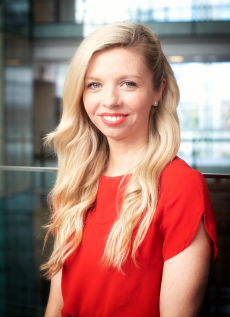
Dr Rachel Wenke is the Director of Allied Health Research for Gold Coast Health. She has mentored over 40 clinicians undertake research projects using a range of designs including randomised controlled trials, mixed methods and qualitative approaches. Rachel has over 19 years' experience as a speech pathologist and her research interests include research capacity building, knowledge translation, rehabilitation models of care and digital solutions to enhance patient and service outcomes. Read more: https://www.researchgate.net/profile/Rachel-Wenke
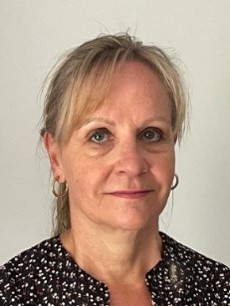
Dr Laetitia Hattingh is Acting Director of Allied Health Research. She has expertise in research methodology and the clinical and social aspects related to health care delivery. Laetitia is a pharmacist with specific research interests in medication management and safety in hospital and primary care, mental health and substance misuse, evaluation of new models of care and ethics/law. Read more: https://www.researchgate.net/profile/Laetitia-Hattingh
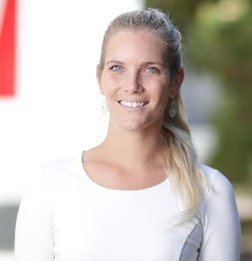
Dr Shelley Roberts is a conjoint Allied Health Research Fellow with GCH and Griffith University. Her background is in nutrition and dietetics, and she is an Accredited Practicing Dietitian. Dr Roberts' research focuses on improving nutrition among hospitalised patients, with particular interests in patient participation in care and patient centred care; healthcare technologies; pressure injury prevention; and integrated knowledge translation. Read more: https://www.researchgate.net/profile/Shelley-Roberts
Dr Caitlin Brandenburg is the conjoint Principal Research Fellow Allied Health with GCH and Bond University. She has experience in a range of research designs, but specialises in qualitative and knowledge translation methodology. Caitlin has a background in Speech Pathology, but has mentored clinicians in diverse fields to achieve success in research. Her own research interests are in health services research and clinician research capacity building. Read more: https://www.researchgate.net/profile/Caitlin-Brandenburg-2
Ms Lenore Smith is a valued member of the Allied Health Research team, providing administrative support across operational activities to the team.
We have various temporarily funded Service Improvement and Research Officer roles that are attached to specific research projects. These projects may be internally funded through Allied Health Research or via externally obtained grant funding and provide a means for clinicians to further develop research skills. Roles are allocated with regard to identified Allied Health Research priority areas and are advertised by internal EOI.
The core function of the GCHHS Allied Health Research and Innovation Leadership Committee (AHRILC) is to provide strategic advice and recommendations regarding research culture and practice, funding opportunities and allocations, research capacity building, research priorities, knowledge translation evidence-based practice, and innovations that may lead to research opportunities. A secondary function of the AHRILC is to foster communication across AH research groups/committees internally and externally.
The committee is chaired by the Director of Allied Health Research Members include research leaders from each of the Allied Health Professions’ own research collaboratives including Audiology, Dietetics, Occupational Therapy, Physiotherapy, Pharmacy, Psychology, Speech Pathology, and Social Work as well as external partners.
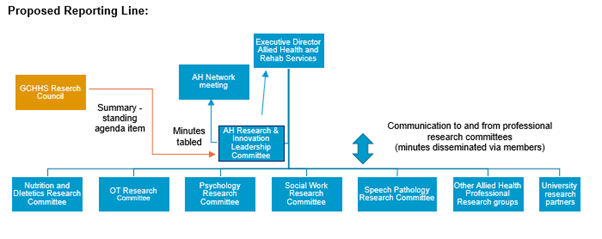
Research Projects and Publications led by Allied Health Research Collaborative
Below are some key projects and publications led by our Allied health Research Collaborative across three main research priority areas for our collaborative.
• Assessment of Discipline Research Officer Intervention in Allied Health (ADROIT): A realist evaluation
• Research capacity, culture and reported activity among Gold Coast Health clinicians: A cross sectional study.
• Spread of structured journal clubs into clinical services using WE-TREAT: A knowledge translation approach
• Co designing a consumer engagement in research framework for Gold Coast Health
• Implementing Good Clinical Practice Standards within Allied Health Research: A mixed-methods exploratory study
Publications:
Wenke, R., Wiseman, J., Stehlik, P. Brandenburg, C., Richards, K., Mickan, M. What do clinicians perceive as the effective implementation strategies for TREAT journal clubs? A qualitative study. BMC Med Educ 25, 427 (2025). https://doi.org/10.1186/s12909-025-06929-x
Ryan, L., Wenke, R., Carlini, J. Weir, K., Shapiro, M., Baglot, N., Tobiano, G., Sargeant, S., Hattingh, L et al. Exploring barriers and solutions to consumer involvement in health service research using a nominal group technique. Res Involv Engagem 10, 72 (2024). https://doi.org/10.1186/s40900-024-00604-z
Ryan L, Hattingh L, Carlini J, Weir K., Shapiro M, Baglot N, Cardona M, Tobiano G, Muir R, Roberts S, Sargeant S, Wenke R (2025) Consumer involvement in health service research: a cross-sectional survey of staff in an Australian public hospital and health service. Australian Health Review 49, AH24186.
Wenke R, Stehlik P, Gerrard J, Mickan S, Henry D. Using a journal club to navigate a maze of COVID-19 papers in a front-line hospital service. BMJ Evid Based Med. 2023 Jun;28(3):210-211. doi: 10.1136/bmjebm-2022-112130.
Wenke R, Roberts S, Angus R, Owusu MA, Weir K.(2023) How do I keep this live in my mind?” Allied Health Professionals’ perspectives of barriers and enablers to implementing Good Clinical Practice in research: A qualitative exploration guided by behaviour change theory. BMC Health Services Researc.
Angus, R.L., Hattingh, H.L. & Weir, K.A. (2022) Experiences of hospital allied health professionals in collaborative student research projects: a qualitative study. BMC Health Serv Res 22, 729
Wenke, R., Wiseman, J., Brandenburg, C, Stehlik, P, Hughes, I., Richards, K., Mickan, S (2022) Long term tailored implementation of structured "TREAT" journal clubs in allied health: a hybrid effectiveness-implementation study. BMC Medical Education, 2022. April 22(1): p. 307.
Mickan, S., Wenke, R., Weir, K., Bialocerkowski, A., Noble, C. (2022) Using knowledge brokering activities to promote allied health clinicians’ engagement in research: a qualitative exploration, BMJ Open, 12 (4) e058453
Hilder, J., Mickan, S., Noble, C., Weir, K. & Wenke, R. (2020). Outcomes of a funding initiative to promote allied health research activity: A qualitative realist. Health Research Policy and Systems. Health Research Policy and Systems 18(1)
Wenke, R., Noble, C., Weir, K., Mickan, S. (2020). What influences allied health clinician participation in research in the public hospital setting: A qualitative theory-informed approach. BMJ Open. 10:e036183. doi: 10.1136/bmjopen-2019-036183
Matus J, Wenke R, Hughes I, Mickan S, (2019) Evaluation of the research capacity and culture of allied health professionals in a large regional public health service. J Multidiscip Healthcare 14;12:83-96.
Matus, J., Wenke., R., Mickan, S (2019). A practical toolkit of strategies for building research capacity in allied health. Asia Pacific Journal of Health Management 14 (2), 5
Mickan, S., Hilder, J., Wenke, R., & Thomas, R. (2019). The impact of a small-group educational intervention for allied health professionals to enhance evidence-based practice: mixed methods evaluation. 19(1), 131. doi:10.1186/s12909-019-1567-1
Wenke, R., O’Shea, K., Hilder, J., Thomas, R., Mickan, S (2019) Factors that influence the sustainability of structured allied health journal clubs: A qualitative study. BMC Medical Education, Jan 3;19(1):6.
Angus RL, Hattingh HL, Weir KA (2024) The health service perspective on determinants of success in allied health student research project collaborations: a qualitative study guided by the Consolidated Framework for Implementation Research. BMC Health Serv Res 2024;24, 143
Wenke, R., Wiseman, J., Stehlik, P, Brandenberg, C, Richards, K, Mickan, S What do clinicians perceive as the effective implementation strategies for TREAT journal clubs? A qualitative study. BMC Med Educ 25, 427 (2025). https://doi.org/10.1186/s12909-025-06929-x
Exploring allied health professionals’ attitudes and perceptions towards artificial intelligence in the clinical setting: a mixed-methods study
AHEAD Project- Allied Health Enhanced by AI-Driven Documentation Project:A mixed-method evaluation of Lyrebird Health
Developing an Ear, Nose and Throat Speech Language Pathology Primary Contact (ENT-SLPPC) ArtiFicial Intelligence (AI) assisted reFerral trIage ClInical DEcision SupporT system (CDSS). The EffiCient SLP study
Technology-assisted, patient-centred nutrition care in hospital: piloting a new model of care
Publications:
Hoffman J, Hattingh L, Shinners L, Angus RL, Richards B, Hughes I, Wenke R. Allied Health Professionals' Perceptions of Artificial Intelligence in the Clinical Setting: Cross-Sectional Survey. JMIR Form Res. 2024 Dec 30;8:e57204. doi: 10.2196/57204. PMID: 39753215; PMCID: PMC11730220.
Hoffman J, Wenke R, Angus RL, Shinners L, Richards B, Hattingh L. Overcoming barriers and enabling artificial intelligence adoption in allied health clinical practice: A qualitative study. DIGITAL HEALTH. 2025;11. doi:10.1177/20552076241311144
Ryan L, Hattingh L. Artificial intelligence medical scribes in allied health: a solution in search of evidence? Aust Health Rev. 2025 Jun;49:AH25064. doi: 10.1071/AH25064. PMID: 40457512.
Roberts S, Marshall AP, Bromiley L, Hopper Z, Byrnes J, Ball L, Collins PF, Kelly J. Patient-Led, Technology-Assisted Malnutrition Risk Screening in Hospital: A Feasibility Study. Nutrients. 2024 Apr 12;16(8):1139. doi: 10.3390/nu16081139. PMID: 38674830; PMCID: PMC11055004.
Hospital to Community (H2C) Discharge Program: An Evaluation
Measuring health-related quality of life (HRQoL) in Gold Coast Hospital and Health Service community health services: A Quality Improvement Project
Evaluation of Allied Health Criteria Led Discharge
Publications:
Ryan, L., Brandenburg, C., Spence, K., Williams, J., Milne, E. J., Leslie, S., Percival, M., Living, L., Rankmore, P., & Hattingh, L. (n.d.). One size doesn’t fit all: Clinician perspectives on using health-related quality of life for service evaluation in Australian community health. Manuscript submitted for publication, Journal of Clinical Evaluation.
Initiatives within Allied Health Research
The following initiatives are currently in place to support allied health professionals to become more active research users, participants, and leaders.
Giving clinicians the time to participate in research.
- The Allied Health Clinical Backfill for Research initiative supports clinicians to go offline for up to 20 days to focus on activities associated with research projects being undertaken within the HHS that align with Allied Health’s vision and mission.
- Evaluation of the early rounds of the initiative have shown meaningful improvements in individual clinician research capacity as well as positive research outputs:
- These monthly lunchtime forums (mostly held on the 3rd Tuesday of each month 12-1pm) showcase clinically meaningful research projects being undertaken by Allied Health Professionals.
- All HHS staff are invited to attend the forums in person over a catered lunch or online and participate in stimulating discussion following the research presentations.
- For more details email AlliedHealthResearchGCH@health.qld.gov.au
The “TREAT” journal club format stands for “Tailoring Research Evidence And Theory” – and was developed by GCH allied health professionals and researchers in 2015. Further information and resources about implementing a TREAT journal club can be found at www.treatjournalclubs.com. Some unique features of TREAT journal clubs compared to standard journal clubs include:
- Journal club topics chosen as a group
- Article is appraised as a group during the session as opposed to only an individual presenting
- Defined roles which rotate between members.
- Each component of the format is based on research evidence
The TREAT journal club format has been investigated in a randomised controlled trial with 125 health professionals and an implementation study with 134 health professionals. We have also learnt key information about what helps sustain TREAT journal clubs, as detailed in Factors that influence the sustainability of structured allied health journal clubs: a qualitative study (nih.gov).
This toolkit consolidates evidence-informed strategies to support research capacity building in allied health. It has been developed as part of the PRO-Allied Health project and is based on the results of a systematic review of existing frameworks for research capacity building.




